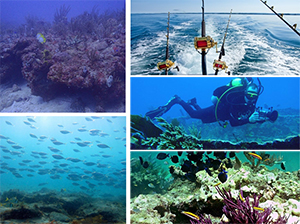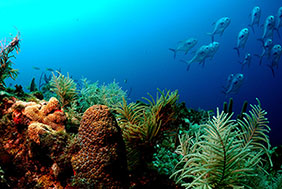-
Home
-
Data & Publications
-
Regional Portals
- About Regional Portals
- Florida
- Navassa Island
- Puerto Rico
- Flower Garden Banks
- U.S. Virgin Islands
- American Samoa
- Commonwealth of the Northern Mariana Islands
- Federated States of Micronesia
- Guam
- Main Hawaiian Islands
- Republic of the Marshall Islands
- Northwestern Hawaiian Islands
- Republic of Palau
- Pacific Remote Island Areas
-
CRCP Activities
- Glossary
Economic Impact Analysis of Recreational Fishing, SCUBA Diving, and Snorkeling on Florida's Coral Reefs

Coral reefs provide important economic and environmental services (also known as ecosystem services) such as food, protection for coasts, recreation and tourism. With all of these services and benefits that coral reefs support, a couple of questions to consider are how much are coral reefs worth and how much do coral reefs impact the economy? In 2016-2017, NOAA's Coral Reef Conservation Program funded two studies to assess the economic impacts to county and state-level Florida economies generated from 1) recreational fishing trips and 2) SCUBA diving and snorkeling trips on Southeast Florida's reefs. The economic impacts of reef-related recreational fishing, diving and snorkeling were estimated and are reported in two reports. The reports include estimates for the Southeast Florida counties of Martin, Palm Beach, Broward, Miami-Dade, Monroe and the state of Florida.
Economic impacts of expenditures on reef-related recreational fishing trips were calculated using NOAA Fisheries' 2016-2017 economic impact estimates for Florida. All impacts were estimated from NOAA Fisheries' regional recreational fishing Input-Output models developed with IMPLAN software. Trip based expenditures on reef-related recreational fishing in Southeast Florida support approximately 3,787 jobs and generate economic output of $384 million. The economic impacts of reef-related recreational fishing were highest for Monroe county, with $173 million generated in output and 1,677 jobs supported, followed by Palm Beach ($80 million output, 803 jobs). Broward ($44 million output, 442 jobs) and Miami Dade ($44 million output, 440 jobs) were nearly identical, and Martin had the lowest impacts ($28 million output, 286 jobs).
The economic impacts of reef-related SCUBA diving and snorkeling were estimated from expenditure data collected via an online survey conducted during October 2016 to October 2017. All impacts were estimated using Input-Output models generated from IMPLAN. Results show that expenditures on reef-related diving and snorkeling in Southeast Florida support 8,668 jobs and generate about $902 million in total economic output over the course of a year in Florida. At the county level, the total economic impacts were highest for Palm Beach, generating about $202 million in economic output and supporting 2,015 jobs over the course of a year. The second highest impacts from snorkeling and diving were for Monroe ($149 million output, 1,756 jobs), followed by Broward ($155 million output, 1,544 jobs), Miami-Dade ($65 million output, 656 jobs), and Martin ($20 million output, 241 jobs).
These studies provide important recreational use estimates and the associated impacts on the local county and state economies. The results can be used to assist in conservation management decision making, public awareness and education, as well as justification for coral reef conservation, tourism and reef related recreation related business interests as part of marketing and promotions.
Citations
Wallmo, K., Lovell,S., Gregg, K., and Allen, M. 2021. Economic Impact Analysis of Recreational Fishing on Florida Reefs. NOAA National Ocean Service, National Coral Reef Conservation Program. NOAA Technical Memorandum CRCP 41. Silver Spring, MD. 11 pp. doi: https://doi.org/10.25923/rsgj-ta64.
Wallmo, K., Edwards, P., Steinback, S., Wusinich-Mendez, D., and Allen, M. 2021. Economic Impact Analysis of Snorkeling and SCUBA Diving on Florida Reefs. NOAA National Ocean Service, National Coral Reef Conservation Program. NOAA Technical Memorandum CRCP 42. Silver Spring, MD. 48 pp. doi: https://doi.org/10.25923/g8ex-r982.
Associated Datasets
Archived data for Southeast Florida Diving and Snorkeling Reef Expenditures from 2016-10-01 to 2017-10-01 (NCEI Accession 0229984): https://www.ncei.noaa.gov/archive/accession/0229984


